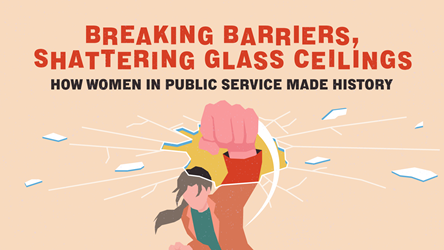23 Things Public Officers Should Know

Whether you’re new or an old-timer public officer, there’s always something to learn about the massive, diverse organisation that is the Singapore Public Service. Read this list for a snapshot of the resources that will help you thrive as a public officer.
For newbies
1. Public Service or Civil Service?
There are 150,000 public officers within the Singapore Public Service, which includes all 16 ministries and more than 50 statutory boards. Within the Public Service is the Civil Service, which comprise about 86,000 officers in the ministries.
Not included in the Civil Service: Officers in statutory boards; the Singapore Armed Forces; and nurses and doctors who work at public hospitals.
2. Know what different public agencies do
Many agencies work together on similar issues, but have different roles and responsibilities. A few examples:
- NParks and NEA:
- ICA and Singapore Customs
Both agencies work on the environment around us. The National Parks Board focuses on parks, park connector networks and Singapore’s greenery, whereas the National Environmental Agency takes care of environmental cleanliness, pollution control, mosquito breeding, hawker centres and also shares weather updates.
Both the Immigration & Checkpoints Authority and Singapore Customs can be found at Singapore’s points of entry. Learn the similarities and differences of what they do.
3. Who’s who in the Singapore Public Service
There are 16 ministries, each led by a Permanent Secretary, and 64 statutory boards that each report to a parent ministry. Statutory boards operate autonomously to focus on a specific function, and are headed by Chief Executives or Managing Directors. The whole Public Service is led by the Head of Civil Service. For a full list of public agencies and leaders, check the Singapore Government Directory.
4. The months leading up to April will always be pretty hectic
That’s because of preparations for the Budget, when the Ministry of Finance holds discussions with public agencies to determine national priorities. Find a breakdown of the process: Budget infographic
5. There are opportunities for you to work overseas
Foreign service officers at the Ministry of Foreign Affairs get posted to overseas missions around the world. The work of building trade and economic ties, as well as sharing Singapore’s expertise, means many public officers travel often for work too.
6. You can’t publicly talk about everything you do at work
Public officers are bound by the Official Secrets Act (OSA), a law inherited from the British in 1935. The OSA forbids the sharing and wrongful communication of official documents, sensitive information and state secrets to anyone who is not authorised.
7. You can still talk to reporters or post online about some things
It all depends on the topic and whether you’re speaking in your personal capacity. If in doubt, check with your boss and corporate communications folks.
8. Check your expectations
With the variety of work in the Public Service, what you do in your role may not always be like what you hear from friends and family, or even other public officers.
Public Service culture and practices
9. From PS21 to PST
The public sector transformation movement is about keeping the Public Service relevant through innovation and readiness for the future. The priorities for the coming years include going digital, improving service delivery and working more closely with citizens. Hear what Head of Civil Service Leo Yip has to say about the latest Public Sector Transformation, or PST.
10. Be on top of the trends affecting Singapore
Blockchain, bots, and new ways of working – in order to be prepared for the future and take advantage of the opportunities for innovation, public officers have to keep any eye on the major trends. Within the Public Service are futures units where strategic foresight officers research trends, but everyone should be reading widely. Start with Challenge articles.
11. To be a good leader, you have to define your values
As an organisation, the Singapore Public Service has values – Integrity, Service, Excellence – for all officers to uphold. Individual public officers have values of their own that guide the way they lead at work, such as having the courage to do the right thing and the humility to keep learning.
12. You’re in charge of your career
Linked to Public Sector Transformation, and to keep up with new challenges, every public officer has to keep learning and have their skills be tip-top. But before you dive into learning the next in-demand skill, first profile yourself and chart where you want to go in your career.
Remember to use the e-learning resources available to you: download the LEARN app from Google Play store or iOS app store to learn on the go.
13. Procurement can seem complex to the uninitiated
The Public Service procures services and products from vendors, and the procurement process may not be intuitive to those unfamiliar with it. To ensure accountability for spending public money, there are several principles to abide by and pitfalls to avoid – always do your due diligence and never cut corners.
14. Move fast, but steadily
While the Public Service has to move with urgency to serve the public as best we can, be mindful that we are stewards of public resources, and changing mindsets and work cultures takes time. Be patient and thorough, and don’t be disheartened by setbacks.
Working with the public and private sector
15. You’ll engage with all segments of people
Public officers have to engage and communicate with all sorts of citizens – young people, heritage enthusiasts, the silver generation and more – so different styles are required. Here is a list of tips from the National Heritage Board for engaging a diverse group of people.
16. We love our mascots
We’ve got Kopi Lim the bear for anti-corruption, Jaga the hedgehog for cybersecurity, and Merli the Merlion to promote tourism. Yes, this is all part of engaging various publics by sharing messages in light-hearted yet memorable ways.
17. There will be plenty to learn from the private sector
From banks to theatre groups, there is plenty to learn from other organisations. Service delivery officers may also have opportunities to do work attachment stints with leading customer-centric companies to learn new skills and practices.
How to survive in the Public Service
18. Cope with Internet surfing separation
To beef up cybersecurity, the Public Service has an Internet surfing separation policy, which means only selected devices have access to the Internet. While some may find this frustrating, many public officers have found different ways to work with the system and even become more productive – get their tips.
19. Know your Public Service jargon
It would take another list just for all the abbreviations and jargon you’ll find bandied about in the Public Service. Here are some to start you off:
- COS: Committee of Supply, a committee of parliamentary members that debates government expenditure for the coming financial year.
- WOGSO: Whole-of-government strategic outcomes. This describes goals on a national scale that require inter-ministry collaboration.
- Regulatory sandbox: A "safe space" where certain regulatory requirements are relaxed so that organisations can experiment with and test innovative products, services or business models.
Decode more Public Service jargon.
20. Network across the Public Service – online
The Public Service has its own enterprise version of Facebook. Get connected with fellow public officers on One Public Service Workplace where you can share ideas and tap on the collective wisdom of the Public Service in real-time. For the latest updates from Challenge, join the Challenge Workplace group.
21. You will still have time for your personal passions
Be sure to make time for personal hobbies, whether it’s as common as football and photography, or more unusual, like clowning around, dressing up and collecting vinyls. Not only will they keep you sane at work, you never know when the things you do and practise for fun will come in useful for work too.
22. Going on a staycation? Use your public officer perks
Public officers can enjoy lower rates for Civil Service Club properties if they are members. This includes the beautiful Changi Cottage, a hideout of the late Minister Mentor Lee Kuan Yew.
23. Inject a dose of humour into the work you do
Laughter means you’ve succeeded in stoking emotions, which makes important messages more memorable. Tackling difficult things with humour could also give a different perspective, as well as build camaraderie and reduce stress at work. It’s definitely an under-rated skill to have.
- POSTED ON
Jan 15, 2019
-
Profile
A Learning Journey At Sea









